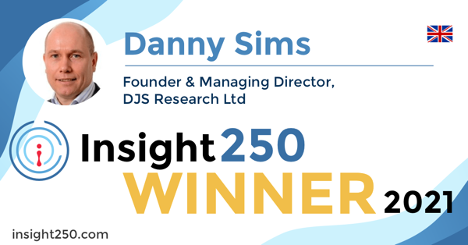Understanding employee ownership
Transitioning to employee-owned business models to incent and empower your workforce.

Article series
Insight250
- The importance of business sense in research
- The role of humour in effective leadership
- The importance of ethics
- The importance of disruption in innovation and leadership
- The importance of Disruption in Innovation and Leadership Part 2
- The importance of Diversity & Inclusion
- The impact of colour
- Communicating insight with impact
- Insights on leadership, culture and polling
- The evolution of electric vehicles
- 2022 Top tips (part 1)
- 2022 Top tips (part 2)
- Maximising the potential of data
- The importance of flexible working
- Winners
- The importance of advanced analytics
- Judges for the 2022 Insight250 Awards announced
- The evolution from social listening to digital intelligence
- The Judges' Perspective
- The judge's perspective - part 2
- Insight Climate Collective
- Insights technology
- Understanding employee ownership
- Global insight perspectives
- Top Tips from our Leaders and Innovators
- The Evolution of Insights in the Food & Beverage Market
- The Evolution of Insights in CPG
- Neural Mechanisms Behind Consumer Decision-Making
- Celebrating and Elevating the Insights Industry
- The State of the Insights Industry
- Opportunities, challenges and threats that AI presents
- 2024 Insight250 Winners Announcement
- Connecting Brands and Consumers Through Insights
- The Importance of Human Insight and Attention
- The Elevating Role of Insights with Technology Innovation
- Haleon’s Insight Expert on Consumer Healthcare
- Insight from the Insight250: How AI is Impacting Qualitative Research
- How AI Tech is Doing the ‘Heavy Lifting’ for Insights
- Reviewing the top tips for 2025
- Google's Sarah Ashley on AI and revolutionising insights - Insights from the Insight250
- Beyond BI: The Future of Decision Intelligence for Insight Professionals
- The Advancement & Impact of Insights - An Insight250 Winners Series perspective with David Smith
- International Jury for the 2025 Insight250 Awards Announced
- Newly elected President, Anne-Sophie, on Revolutionizing the Impact of Insights
- Haleon's Litthya Baez on Enhancing Healthcare with Insights - Insight250 Winners Series
- Understanding the Insights of Consumer Decisions
- Moving Beyond Dashboards to Deliver Decisions with AI
- How AI is Transforming Insights
- How AI is Transforming Insights
- Five Years of Insight250: Elevating the Insight Industry
The Insight250 spotlights and celebrates 250 of the world’s premier leaders and innovators in market research, consumer insights and data-driven marketing. The inaugural list was revealed this April and created renewed excitement across the industry whilst strengthening the connectivity of the market research community.
With so many exceptional professionals named to the Insight250, it seems fitting to tap into their expertise and unique perspectives across an array of topics. This weekly series does just that, inquiring about the expert perspectives of many of these individuals in a series of short topical features.
This edition features Danny Sims, the Founder and Chairman of DJS Research Ltd. As recruiting and retaining talent has become increasingly challenging, some companies have transitioned to employee-owned models to incent and empower their workforce. Danny has led DJS Research Ltd to transition to this employee-owned approach. I spoke to him about the model in terms of its benefits and challenges to the overall organisation and its individual employees and found his insight to be incredibly beneficial to understand this growing trend.
Danny, for the international readership, can you explain a little about what employee ownership means?
“Yes, employee ownership describes when a business is fully or partly owned by its employees. It is a progressive way to structure a business and aims to give staff more of a sense of belonging, accountability, and to be involved in its future plans and opportunities. It also allows all staff to potentially benefit financially from the future success of the company.
“At DJS Research, an Employee Ownership Trust (EOT) has been set up to hold shares in DJS Research for the benefit of our employees. It is managed by our Trustee Board that has to meet certain legal requirements and ensure that we are acting in the best interests of employees at all times. We are one of around 700 employee-owned companies using an EOT in the UK.
“The UK's employee-owned business sector is growing because co-owned companies tend to be more successful, competitive, profitable and sustainable.”
Danny Sims
How do you feel employee ownership can help to drive innovation and leadership?
“Because staff are co-owners, they tend to be more entrepreneurial and committed to the company and its success. Research has shown that employee ownership drives better business performance, employee commitment and engagement, and drives innovation and efficiency. I think it really helps because managers go out of their way to consult, share information about the company and give staff responsibility. Employee-owned companies have high employment standards, involve staff and give everyone a stake. A combination of shared ownership and employee participation delivers superior business performance.”
Danny Sims
Since you moved to employee ownership at DJS Research, what has surprised you most - does the company feel different?
“DJS Research became employee-owned in July 2021, so it's still early days for us, and the transition will be a journey over time. However, we have already made significant progress in a short space of time. We have consulted all staff to feed into our strategic planning process for the next few years. Staff across all parts of the business have been full of ideas about how we can develop and continue to improve as a business. We have also set up EO Voice where representatives meet regularly to provide ongoing feedback and suggestions to the Board, and likewise, the Board are able to communicate back. So staff have definitely been put at the heart of everything the company does, and we are beginning to see the impact of this.”
Danny Sims
How have the employees (or new owners) reacted to the change?
“We had a mixed reaction, I would say. Most were really pleased and some even relieved that we were not going to be sold to another company. A lot of our staff have had negative experiences of trade sales and mergers in the past, so remaining independent, job security and having a legacy were important. Some initially didn’t know or understand much about employee ownership, so were ambivalent in their view, but they are interested to see how the journey unfolds. We had one or two employees, I think, who were disappointed because we didn’t consider the management buyout route. But overall, I would say it has gone very well with both staff and clients.”
Danny Sims
Recruitment in the industry is currently difficult. Has this made recruitment easier, and how about staff retention?
“The Employee Ownership Association has said that because employee-owned companies have high employment standards, involve staff and give everyone a stake, they are better at recruiting and retaining talent. I would say this is ringing true with us as well. Our employee-owned status is a big rubber stamp outlining the type of company we are. We've had lots of new staff join the company over the last two years, and I think all of them have mentioned and been impressed by our employee-owned status. They have said that they know they will be joining a responsible company where they have a voice and a say. After our new staff have had time to settle in, I make sure I speak to all of them. What's been really pleasing to hear is that they are saying, ‘it’s true you really are a good company to work for’.”
Danny Sims
What advice would you give to any other business owners considering this move?
“I recently spoke about this at the Employee Ownership Association annual conference. The video link to my talk can be found here. This explains in full the advice I would give. In summary, though, I would say do thorough research to fully understand what employee ownership is and ask yourself is this right for you as the owner and for your business.”
Danny Sims
Are there any pitfalls that they should watch out for?
“I would say it is crucial that you find professionals who have undertaken employee-owned transactions previously. So an Accountant and Solicitor that are experienced in this new sector – many are still not aware of it, and it is different to a trade sale. I also feel strongly that there needs to be a thorough and transparent communication piece prior to completion for all staff – so that they are on-board right from the beginning.”
Danny Sims
HOT TOPIC
Remote/Hybrid working: DJS Research has been growing fast and pushing remote working hard - what do you see as the benefits and the potential pitfalls?
“We have had remote workers at DJS Research for years – it can and does work. One major benefit is that it allows us to further access the best talent across the UK. We do need to work hard, however, ensuring that we integrate and fully include remote and hybrid workers at every opportunity. So it’s important to bring teams and the whole company together as often as you can.”
Danny Sims
TOP TIP
“Create a purpose-driven and inclusive culture where you listen to staff and harness their ideas – you will uncover hidden talents that will help fuel growth and business improvement.”
Danny Sims
Thanks, Danny a fascinating insight into a new and innovative trend. Thank you for taking the time to talk through your experience.
 Danny Sims established DJS Research Ltd. in 2001 and won inclusion to the Insight250 as Managing Director. Danny now serves as its Chairman. He has over 15 years of research experience with expertise in qualitative and quantitative methods, ad-hoc and continuous research, brand tracking and customer insight from market sector specialists. Previously he held research roles with BMR and BPRI.
Danny Sims established DJS Research Ltd. in 2001 and won inclusion to the Insight250 as Managing Director. Danny now serves as its Chairman. He has over 15 years of research experience with expertise in qualitative and quantitative methods, ad-hoc and continuous research, brand tracking and customer insight from market sector specialists. Previously he held research roles with BMR and BPRI.
Crispin Beale
Chairman at QuMind, CEO at Insight250, Senior Strategic Advisor at mTab, CEO at IDXCrispin Beale is a marketing, data and customer experience expert. Crispin spent over a decade on the Executive Management Board of Chime Communications as Group CEO of leading brands such as Opinion Leader, Brand Democracy, Facts International and Watermelon. Prior to this Crispin held senior marketing and insight roles at BT, Royal Mail Group and Dixons. Crispin originally qualified as a chartered accountant and moved into management consultancy with Coopers & Lybrand (PwC). Crispin has been a Board Director (and Chairman) of the MRS for nearly 20 years and UK ESOMAR Representative for c15 years. As well as being CEO of Insight250, Crispin is currently Worldwide CEO of Digital Communications Solution Agency, IDX. Crispin is also the Senior Strategic Advisor at mTab and the Chairman of QuMind and spent 4 years as Group President of Behaviorally where he was responsibile for the client & commercial teams globally. Crispin is a passionate advocate for blending human intelligence and technology to deliver innovation and leadership across organisations.
Article series
Insight250
- The importance of business sense in research
- The role of humour in effective leadership
- The importance of ethics
- The importance of disruption in innovation and leadership
- The importance of Disruption in Innovation and Leadership Part 2
- The importance of Diversity & Inclusion
- The impact of colour
- Communicating insight with impact
- Insights on leadership, culture and polling
- The evolution of electric vehicles
- 2022 Top tips (part 1)
- 2022 Top tips (part 2)
- Maximising the potential of data
- The importance of flexible working
- Winners
- The importance of advanced analytics
- Judges for the 2022 Insight250 Awards announced
- The evolution from social listening to digital intelligence
- The Judges' Perspective
- The judge's perspective - part 2
- Insight Climate Collective
- Insights technology
- Understanding employee ownership
- Global insight perspectives
- Top Tips from our Leaders and Innovators
- The Evolution of Insights in the Food & Beverage Market
- The Evolution of Insights in CPG
- Neural Mechanisms Behind Consumer Decision-Making
- Celebrating and Elevating the Insights Industry
- The State of the Insights Industry
- Opportunities, challenges and threats that AI presents
- 2024 Insight250 Winners Announcement
- Connecting Brands and Consumers Through Insights
- The Importance of Human Insight and Attention
- The Elevating Role of Insights with Technology Innovation
- Haleon’s Insight Expert on Consumer Healthcare
- Insight from the Insight250: How AI is Impacting Qualitative Research
- How AI Tech is Doing the ‘Heavy Lifting’ for Insights
- Reviewing the top tips for 2025
- Google's Sarah Ashley on AI and revolutionising insights - Insights from the Insight250
- Beyond BI: The Future of Decision Intelligence for Insight Professionals
- The Advancement & Impact of Insights - An Insight250 Winners Series perspective with David Smith
- International Jury for the 2025 Insight250 Awards Announced
- Newly elected President, Anne-Sophie, on Revolutionizing the Impact of Insights
- Haleon's Litthya Baez on Enhancing Healthcare with Insights - Insight250 Winners Series
- Understanding the Insights of Consumer Decisions
- Moving Beyond Dashboards to Deliver Decisions with AI
- How AI is Transforming Insights
- How AI is Transforming Insights
- Five Years of Insight250: Elevating the Insight Industry


